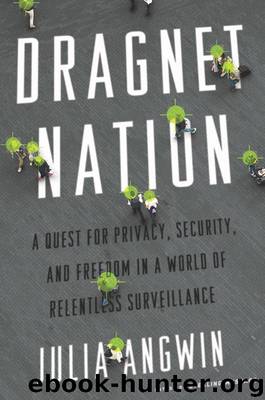Dragnet Nation by Julia Angwin

Author:Julia Angwin
Language: eng
Format: mobi
Publisher: Henry Holt and Company
Published: 2014-03-19T06:24:40+00:00
12
THE HALL OF MIRRORS
When Rayne Puertos started a new job at a computer retailer in Tampa, Florida, she was not trying to hide her sexual orientation, but neither was she hoping to advertise it to her new colleagues. But her cover was blown when she checked her Facebook profile on the shared computer in the communal break room. One of her colleagues leaned over and said, “Look—all the ads on your page are all gay ads. Why is that?”
To her dismay, Facebook’s customized ads had outed her.
“I’m very out and very gay,” she told me. “But when I’m at work I’m not there to talk about my personal life.” After that incident, she started checking her Facebook profile on her phone rather than on the shared work computer.
Rayne was outed by one of the most supposedly innocent types of dragnets—the Hall of Mirrors that advertisers create from personal data they sweep up across the Internet.
* * *
The online ad-tracking industry has created one of the most comprehensive dragnets in the world.
Most websites invite dozens of ad-tracking companies to spy on their visitors and to follow them across the Web. In 2013, there were 328 separate companies tracking visitors to the top fifty content Web sites, according to a study by Krux Digital, a company that monitors digital tracking technology. That’s nearly double the 167 companies that Krux found stalking visitors on the top fifty sites in 2011.
The information collected by ad-tracking companies is extremely detailed. Ashley Hayes-Beaty was shocked when she learned that an ad-tracking company had placed a file on her computer containing a single code—4c812db292272995e5416a323e79bd37—that secretly identified her as a twenty-six-year-old female in Nashville, Tennessee. In addition, the company had compiled a list of her favorite movies, including The Princess Bride, 50 First Dates, and 10 Things I Hate About You. “Well, I like to think I have some mystery left to me, but apparently not!” she said when I told her what her profile contained. “The profile is eerily correct.”
Seventeen-year-old Cate Reid didn’t know why she saw only weight-loss ads online, until my Wall Street Journal colleague Emily Steel showed her that Yahoo!’s advertising network had pegged her as a thirteen- to eighteen-year-old female interested in weight loss.
And Google accurately identified a dozen of ten-year-old Jenna Maas’s likes, including pets, photography, “virtual worlds,” and online goodies such as animated graphics. “I don’t like everyone knowing what I’m doing and stuff,” Jenna told my Wall Street Journal colleague Steve Stecklow, when he showed her what Google knew about her.
The online tracking companies say that the information they obtain is anonymous, and thus innocuous. A typical response: a Google spokesman said its tracking of Jenna was “based on anonymous browser activity. We don’t know if it’s one user or four using a particular browser, or who those users are.”
But there is increasing evidence that information about people’s Web habits can uniquely identify them. In 2006, the New York Times combed through anonymous search query records released by AOL and managed to identify the searches conducted by a sixty-two-year-old woman named Thelma Arnold.
Download
This site does not store any files on its server. We only index and link to content provided by other sites. Please contact the content providers to delete copyright contents if any and email us, we'll remove relevant links or contents immediately.
| Advertising | Consumer Behavior |
| Customer Service | Marketing |
| Public Relations | Sales & Selling |
| Search Engine Optimization |
Influence: The Psychology of Persuasion by Robert B. Cialdini(4796)
The Miracle Morning by Hal Elrod(4727)
The Hacking of the American Mind by Robert H. Lustig(4382)
Pre-Suasion: A Revolutionary Way to Influence and Persuade by Robert Cialdini(4232)
Unlabel: Selling You Without Selling Out by Marc Ecko(3662)
Ogilvy on Advertising by David Ogilvy(3622)
Hidden Persuasion: 33 psychological influence techniques in advertising by Marc Andrews & Matthijs van Leeuwen & Rick van Baaren(3565)
Purple Cow by Seth Godin(3203)
Who Can You Trust? by Rachel Botsman(3133)
Kick Ass in College: Highest Rated "How to Study in College" Book | 77 Ninja Study Skills Tips and Career Strategies | Motivational for College Students: A Guerrilla Guide to College Success by Fox Gunnar(3129)
The Marketing Plan Handbook: Develop Big-Picture Marketing Plans for Pennies on the Dollar by Robert W. Bly(3062)
This Is Marketing by Seth Godin(3038)
I Live in the Future & Here's How It Works by Nick Bilton(2997)
The Power of Broke by Daymond John(2985)
The Tipping Point by Malcolm Gladwell(2921)
Building a StoryBrand by Donald Miller(2912)
The 46 Rules of Genius: An Innovator's Guide to Creativity (Voices That Matter) by Marty Neumeier(2855)
Draw to Win: A Crash Course on How to Lead, Sell, and Innovate With Your Visual Mind by Dan Roam(2784)
Market Wizards by Jack D. Schwager(2700)
